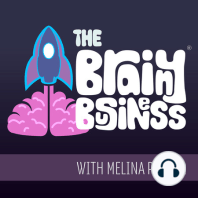48 min listen

154. Failure is an Opportunity not Ending, with Madeline Quinlan
FromThe Brainy Business | Understanding the Psychology of Why People Buy | Behavioral Economics
154. Failure is an Opportunity not Ending, with Madeline Quinlan
FromThe Brainy Business | Understanding the Psychology of Why People Buy | Behavioral Economics
ratings:
Length:
47 minutes
Released:
May 28, 2021
Format:
Podcast episode
Description
Today I am honored to be joined by Madeline (Maddie) Quinlan, co-founder of Salient. Just like last week’s guest, Nuala Walsh, you’ve heard Maddie’s voice when she was part of the contingent who came on to discuss the Global Association of Applied Behavioral Scientists, or GAABS, when it first launched in the fall of 2020. In addition to being head of membership and a co-founder of GAABS, in her role as a director of Salient, Maddie works as a behavioral scientist and has expertise spanning private, public, and not-for-profit organizations. She focuses primarily on the areas of finance, energy, and risk management. I also love that her bio states that she believes in “relentless betterment and radical authenticity” – great word choice! Show Notes: [00:06] In today’s episode, I’m very delighted to introduce you to Maddie Quinlan, co-founder of Salient. [01:01] In addition to being head of membership and a co-founder of GAABS, in her role as a director of Salient, Maddie works as a behavioral scientist and has expertise spanning private, public, and not-for-profit organizations. [03:11] Maddie shares more about who she is and what she does. She has been working exclusively as a behavioral scientist for the last three years and prior to that, she worked a lot in finance. [04:26] She shares more about her leap from finance to behavioral science. [06:07] She ended up leaving her job in finance to go from Canada to England to obtain her master’s degree in behavioral science from the London School of Economics. [06:46] Melina shares her (very similar!) story about the moment she knew her destiny was in behavioral economics. [08:52] Maddie met her business partner through the program in London and they started Salient in the middle of doing their dissertations. [11:38] If you are really pursuing something that rings true to you or something that you are incredibly passionate about...something that really embodies who you are...it becomes so much more. When you live and work that way, you end up attracting others with the same perspective and interests. Then, you can all work together to elevate that common passion over time. You find your tribe. [12:24] Any individual behavioral scientist can still move things, but if we all band together then that is where really fundamental and impactful change can happen. [13:59] Salient was created to bridge the gap from the academic side and practical application side and be able to take them to different sectors. [15:32] In the world of behavioral science and behavior change, we know that some things work and we know that a lot of things don’t. [16:59] She shares one of her favorite projects in the pension space. [17:33] If you want somebody to do something you must make it easy. [18:57] What people think and say they want is very different from how they actually behave and show up. [21:12] Context definitely matters when deciding if you start with questions or just jump into testing. In an ideal world you can do some qualitative testing to inform your more large and widespread quantitative work. [22:12] They suggest piloting a lot. It is beneficial for clients, project owners, and behavioral scientists. [25:10] Just because something didn’t happen the way you wanted it to, doesn’t mean that it is bad. It can be a good opportunity to dig in a little bit further. [25:27] The biggest mistake businesses make when they go to apply behavioral science or behavioral economics is they start working on the wrong problem and jump straight into “solving” mode. [27:10] The insights on what doesn’t work are just as valuable as what does. [28:39] In her dissertation study, they found that the meditation group had a measurably higher rate of temporal (time) discounting than the control and the jazz condition. People were actually more likely to consume in the present and choose that smaller “sooner” reward over a larger “later” reward. [29:50] We as a field need to embrace the results instea
Released:
May 28, 2021
Format:
Podcast episode
Titles in the series (100)
6. How To Sell From The Stage: Last week, I talked about , you might want to listen to that episode before we dive into today’s episode about how to sell from the stage. Both are built on the same foundation. In the truth about pricing “it’s not about the cookie,” there... by The Brainy Business | Understanding the Psychology of Why People Buy | Behavioral Economics